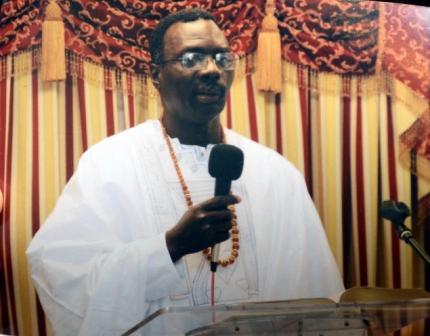Oluwole Olofin was at the wheel of his cab when he was murdered in 1992, but it took him 21 more years to die.
Now that the Nigerian immigrant has succumbed to the wounds he suffered two decades ago when he was shot in the head during a fare dispute, his family is praying the NYPD finally tracks down the gunman who turned his last years into a living hell.
“He went 21 years without any closure of knowing the guy got arrested,” said Olofin’s 15-year-old son, Samson. “Maybe if he got caught it would put his soul at peace.”
Doctors couldn’t remove the bullet and Olofin — his face partially disfigured from the gunshot and numerous surgeries — was in almost constant pain, his oldest daughter said.
But Olofin continued driving, working at the supermarket he opened with his wife, and raising their four children until he suffered a seizure and wound up in a coma for six months.
“He did whatever he had to do to take care of his kids,” Olofin’s older daughter, Tetunde, said.
Olofin was 60 when he died May 5 at the Eastchester Rehabilitation and Health Care Center in the Bronx. He was found that day at 9:45 p.m., face up in bed, police said.
The medical examiner classified Olofin’s death a homicide on June 3, citing as the cause multiple complications including posttraumatic seizure disorder due to the gunshot.
Now Olofin’s family wants the police to find his killer.
“I don’t know if the person’s out there,” Tetunde said. “It really bothers me. I just want to see who the person is.”

RICHARD HARBUS/FOR NEW YORK DAILY NEWS
A family member holds a picture of Olofin, who continued driving his cab after the shooting until he became too sick to work.
Olofin immigrated from Nigeria to New York City in 1991 and quickly landed a job driving a taxi. His dream was to study medicine. He found an apartment in the Bronx and soon he was sending money back home to support his family.
Then, on Dec. 29, 1992 — at the corner of Utica Ave. and Dean St. in Brooklyn — Olofin came face-to-face with his executioner. He was 40 at the time.
“Whoever he carried, they didn’t want to pay,” Tetunde said.
But the passenger “got out of the car and shot him in the side of the head,” she said. “That’s what he remembered.”
Pain became Olofin’s constant companion.
Later he began acting paranoid and he separated from his wife four years ago.
So he was alone when he was felled by the seizure in January 2011. For six months, Olofin lay unconscious at Jacobi Medical Center.
Olofin was transferred from the hospital to Eastchester last winter. But he couldn’t talk and was fading fast.
Tetunde said she saw her dad at the nursing home shortly before he died.
“At his funeral there was so many people because he was a nice person,” she said.



Leave a Reply